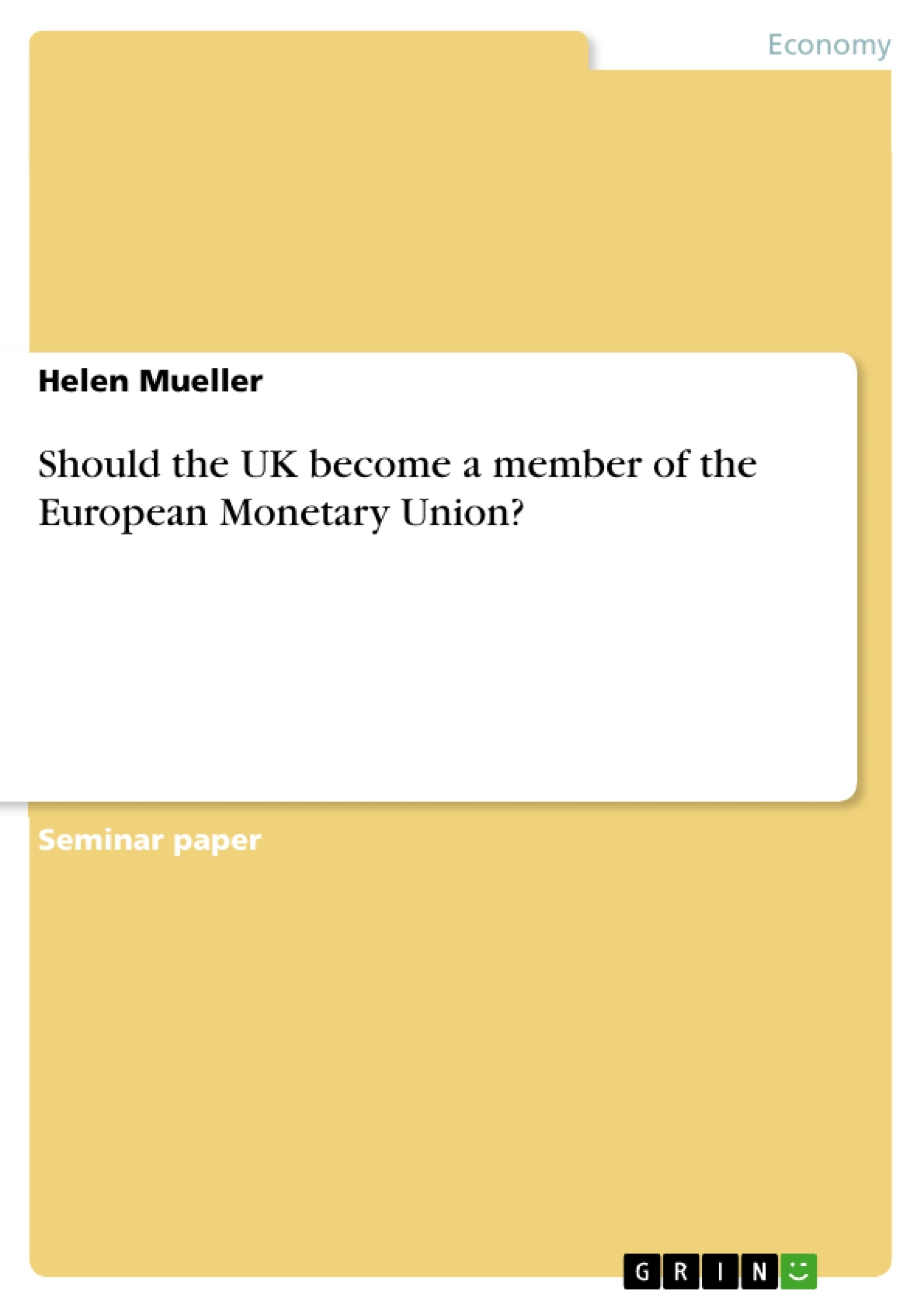Background of EMU and current situation of the UK
Since 1952 when the European Coal and Steel Community was founded the face of Europe has changed a lot. Barriers have been removed to enable goods, services, investment and people to move freely within the Community and politicians worked hard to get closer to the ideal of a political and economical united Europe. In two months the next major step will be taken by 12 nations of the European Union: The EURO will replace the old currencies. But Britain, although a member of the European Union, will not participate in Euro-zone in the foreseeable future.
In 1991 the Maastricht Treaty (Treaty on European Union) was signed in order to extend the Treaty of Rome (1957). One part of this Treaty was the formation of an economic and monetary union (EMU). Therefore the European Central Bank (ECB) was established and a new currency - the ECU, today called Euro. The ECB shall replace the national central banks and its "primary objective is to maintain a low and stable rate of price inflation for the euro currency." 1)
Although Britain had joined the exchange rate system (ERS), the so called "parity grid" of the European Monetary System (EMS) in 1990 and had also signed the Maastricht Treaty it was forced to leave the EMS on Wednesday, 16 September 1992, known as "Black Wednesday". Sterling had dropped below the "floor" of the grid and all measures to support the currency failed.
The UK gained opt-outs from stage 3 of EMU during the Maastricht conference, which means: "UK shall notify the council whether it intends to move to the third stage, and that unless it does, it will be under no obligation to do so." 2) Now, as the EMU comes closer the subject presses hard on the Blair-government but a date for the planned referendum, which shall bring a decision, is still not stated.
[...]
Inhaltsverzeichnis (Table of Contents)
- Background of EMU and current situation of the UK
- Is Europe an Optimum Currency Area (OCA) and which role does the UK play?
- What makes UK into a periphery country?
- Pros and Cons
- Arguments for joining EMU
- Arguments against joining EMU
Zielsetzung und Themenschwerpunkte (Objectives and Key Themes)
This text critically evaluates the potential benefits and drawbacks of the UK joining the European Monetary Union (EMU), focusing on the implications for the country's economy and business environment. It aims to provide a balanced analysis of the economic and political considerations surrounding this decision.
- The history and current state of the European Monetary Union
- The concept of an Optimum Currency Area (OCA) and the UK's role within it
- Factors contributing to the UK's position as a periphery country within the EU
- Economic arguments for and against UK membership in the EMU
- The impact of EMU on UK business and the broader economy
Zusammenfassung der Kapitel (Chapter Summaries)
- The first chapter provides an overview of the European Monetary Union, its origins, and the current situation of the UK in relation to it. It discusses the formation of the EMU, the establishment of the European Central Bank, and the UK's decision to opt out of the third stage.
- The second chapter delves into the concept of an Optimum Currency Area, examining the criteria for determining whether a group of countries is suitable for a single currency. It assesses the UK's position within this framework, highlighting the potential costs and benefits of joining the EMU.
- The third chapter focuses on the factors that contribute to the UK's classification as a periphery country within the EU, contrasting it with the "core" countries like Germany and France. It examines differences in economic structure, business cycles, and financial systems.
- The fourth chapter outlines the key arguments both for and against the UK joining the EMU. It discusses potential advantages like reduced transaction costs, currency stability, and increased competitiveness, alongside concerns about the loss of monetary independence and the potential for asymmetric shocks.
Schlüsselwörter (Keywords)
The primary keywords and focus topics of this text are the European Monetary Union (EMU), Optimum Currency Area (OCA), UK economy, business environment, trade integration, asymmetric shocks, and monetary independence.
Frequently Asked Questions
What is the European Monetary Union (EMU)?
The EMU is an economic and monetary union of EU member states that share a common currency, the Euro, and a common monetary policy managed by the European Central Bank (ECB).
Why did the UK opt out of the Euro?
The UK secured an "opt-out" during the Maastricht Treaty negotiations, allowing it to decide for itself whether and when to join the third stage of the EMU.
What was 'Black Wednesday' in 1992?
On September 16, 1992, the British government was forced to withdraw the Pound Sterling from the European Exchange Rate Mechanism (ERM) after failing to keep it above the required exchange limit.
What is an Optimum Currency Area (OCA)?
An OCA is a geographical region in which it would maximize economic efficiency to have the entire region share a single currency. The paper assesses if the EU meets these criteria for the UK.
What are the main arguments against the UK joining the EMU?
Concerns include the loss of national monetary independence, the inability to respond to asymmetric economic shocks, and differences in economic structure compared to "core" countries like Germany.
- Quote paper
- Helen Mueller (Author), 2001, Should the UK become a member of the European Monetary Union?, Munich, GRIN Verlag, https://www.grin.com/document/4168



